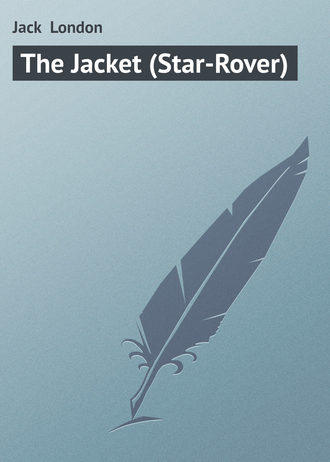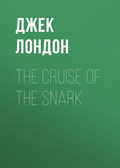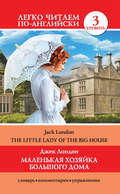
Джек Лондон
The Jacket (Star-Rover)
* * * * *
At the end of my eighth year on the island in the month of September, when I had just sketched most ambitious plans to raise my pyramid to sixty feet above the summit of the island, I awoke one morning to stare out upon a ship with topsails aback and nearly within hail. That I might be discovered, I swung my oar in the air, jumped from rock to rock, and was guilty of all manner of livelinesses of action, until I could see the officers on the quarter-deck looking at me through their spyglasses. They answered by pointing to the extreme westerly end of the island, whither I hastened and discovered their boat manned by half a dozen men. It seems, as I was to learn afterward, the ship had been attracted by my pyramid and had altered its course to make closer examination of so strange a structure that was greater of height than the wild island on which it stood.
But the surf proved to be too great to permit the boat to land on my inhospitable shore. After divers unsuccessful attempts they signalled me that they must return to the ship. Conceive my despair at thus being unable to quit the desolate island. I seized my oar (which I had long since determined to present to the Philadelphia Museum if ever I were preserved) and with it plunged headlong into the foaming surf. Such was my good fortune, and my strength and agility, that I gained the boat.
I cannot refrain from telling here a curious incident. The ship had by this time drifted so far away, that we were all of an hour in getting aboard. During this time I yielded to my propensities that had been baffled for eight long years, and begged of the second mate, who steered, a piece of tobacco to chew. This granted, the second mate also proffered me his pipe, filled with prime Virginia leaf. Scarce had ten minutes passed when I was taken violently sick. The reason for this was clear. My system was entirely purged of tobacco, and what I now suffered was tobacco poisoning such as afflicts any boy at the time of his first smoke. Again I had reason to be grateful to God, and from that day to the day of my death, I neither used nor desired the foul weed.
* * * * *
I, Darrell Standing, must now complete the amazingness of the details of this existence which I relived while unconscious in the strait-jacket in San Quentin prison. I often wondered if Daniel Foss had been true in his resolve and deposited the carved oar in the Philadelphia Museum.
It is a difficult matter for a prisoner in solitary to communicate with the outside world. Once, with a guard, and once with a short-timer in solitary, I entrusted, by memorization, a letter of inquiry addressed to the curator of the Museum. Although under the most solemn pledges, both these men failed me. It was not until after Ed Morrell, by a strange whirl of fate, was released from solitary and appointed head trusty of the entire prison, that I was able to have the letter sent. I now give the reply, sent me by the curator of the Philadelphia Museum, and smuggled to me by Ed Morrell:
* * * * *
“It is true there is such an oar here as you have described. But few persons can know of it, for it is not on exhibition in the public rooms. In fact, and I have held this position for eighteen years, I was unaware of its existence myself.
“But upon consulting our old records I found that such an oar had been presented by one Daniel Foss, of Elkton, Maryland, in the year 1821. Not until after a long search did we find the oar in a disused attic lumber-room of odds and ends. The notches and the legend are carved on the oar just as you have described.
“We have also on file a pamphlet presented at the same time, written by the said Daniel Foss, and published in Boston by the firm of N. Coverly, Jr., in the year 1834. This pamphlet describes eight years of a castaway’s life on a desert island. It is evident that this mariner, in his old age and in want, hawked this pamphlet about among the charitable.
“I am very curious to learn how you became aware of this oar, of the existence of which we of the museum were ignorant. Am I correct in assuming that you have read an account in some diary published later by this Daniel Foss? I shall be glad for any information on the subject, and am proceeding at once to have the oar and the pamphlet put back on exhibition.
“Very truly yours,
“HOSEA SALSBURTY.”[1]
CHAPTER XX
The time came when I humbled Warden Atherton to unconditional surrender, making a vain and empty mouthing of his ultimatum, “Dynamite or curtains.” He gave me up as one who could not be killed in a strait-jacket. He had had men die after several hours in the jacket. He had had men die after several days in the jacket, although, invariably, they were unlaced and carted into hospital ere they breathed their last… and received a death certificate from the doctor of pneumonia, or Bright’s disease, or valvular disease of the heart.
But me Warden Atherton could never kill. Never did the urgency arise of carting my maltreated and perishing carcass to the hospital. Yet I will say that Warden Atherton tried his best and dared his worst. There was the time when he double-jacketed me. It is so rich an incident that I must tell it.
It happened that one of the San Francisco newspapers (seeking, as every newspaper and as every commercial enterprise seeks, a market that will enable it to realize a profit) tried to interest the radical portion of the working class in prison reform. As a result, union labour possessing an important political significance at the time, the time-serving politicians at Sacramento appointed a senatorial committee of investigation of the state prisons.
This State Senate committee investigated (pardon my italicized sneer) San Quentin. Never was there so model an institution of detention. The convicts themselves so testified. Nor can one blame them. They had experienced similar investigations in the past. They knew on which side their bread was buttered. They knew that all their sides and most of their ribs would ache very quickly after the taking of their testimony… if said testimony were adverse to the prison administration. Oh, believe me, my reader, it is a very ancient story. It was ancient in old Babylon, many a thousand years ago, as I well remember of that old time when I rotted in prison while palace intrigues shook the court.
As I have said, every convict testified to the humaneness of Warden Atherton’s administration. In fact, so touching were their testimonials to the kindness of the Warden, to the good and varied quality of the food and the cooking, to the gentleness of the guards, and to the general decency and ease and comfort of the prison domicile, that the opposition newspapers of San Francisco raised an indignant cry for more rigour in the management of our prisons, in that, otherwise, honest but lazy citizens would be seduced into seeking enrolment as prison guests.
The Senate Committee even invaded solitary, where the three of us had little to lose and nothing to gain. Jake Oppenheimer spat in its faces and told its members, all and sundry, to go to hell. Ed Morrell told them what a noisome stews the place was, insulted the Warden to his face, and was recommended by the committee to be given a taste of the antiquated and obsolete punishments that, after all, must have been devised by previous Wardens out of necessity for the right handling of hard characters like him.
I was careful not to insult the Warden. I testified craftily, and as a scientist, beginning with small beginnings, making an art of my exposition, step by step, by tiny steps, inveigling my senatorial auditors on into willingness and eagerness to listen to the next exposure, the whole fabric so woven that there was no natural halting place at which to drop a period or interpolate a query… in this fashion, thus, I got my tale across.
Alas! no whisper of what I divulged ever went outside the prison walls. The Senate Committee gave a beautiful whitewash to Warden Atherton and San Quentin. The crusading San Francisco newspaper assured its working-class readers that San Quentin was whiter than snow, and further, that while it was true that the strait-jacket was still a recognized legal method of punishment for the refractory, that, nevertheless, at the present time, under the present humane and spiritually right-minded Warden, the strait-jacket was never, under any circumstance, used.
And while the poor asses of labourers read and believed, while the Senate Committee dined and wined with the Warden at the expense of the state and the tax payer, Ed Morrell, Jake Oppenheimer, and I were lying in our jackets, laced just a trifle more tightly and more vindictively than we had ever been laced before.
“It is to laugh,” Ed Morrell tapped to me, with the edge of the sole of his shoe.
“I should worry,” tapped Jake.
And as for me, I too capped my bitter scorn and laughter, remembered the prison houses of old Babylon, smiled to myself a huge cosmic smile, and drifted off and away into the largeness of the little death that made me heir of all the ages and the rider full-panoplied and astride of time.
Yea, dear brother of the outside world, while the whitewash was running off the press, while the august senators were wining and dining, we three of the living dead, buried alive in solidarity, were sweating our pain in the canvas torture.
And after the dinner, warm with wine, Warden Atherton himself came to see how fared it with us. Me, as usual, they found in coma. Doctor Jackson for the first time must have been alarmed. I was brought back across the dark to consciousness with the bite of ammonia in my nostrils. I smiled into the faces bent over me.
“Shamming,” snorted the Warden, and I knew by the flush on his face and the thickness in his tongue that he had been drinking.
I licked my lips as a sign for water, for I desired to speak.
“You are an ass,” I at last managed to say with cold distinctness. “You are an ass, a coward, a cur, a pitiful thing so low that spittle would be wasted on your face. In such matter Jake Oppenheimer is over-generous with you. As for me, without shame I tell you the only reason I do not spit upon you is that I cannot demean myself nor so degrade my spittle.”
“I’ve reached the limit of my patience!” he bellowed. “I will kill you, Standing!”
“You’ve been drinking,” I retorted. “And I would advise you, if you must say such things, not to take so many of your prison curs into your confidence. They will snitch on you some day, and you will lose your job.”
But the wine was up and master of him.
“Put another jacket on him,” he commanded. “You are a dead man, Standing. But you’ll not die in the jacket. We’ll bury you from the hospital.”
This time, over the previous jacket, the second jacket was put on from behind and laced up in front.
“Lord, Lord, Warden, it is bitter weather,” I sneered. “The frost is sharp. Wherefore I am indeed grateful for your giving me two jackets. I shall be almost comfortable.”
“Tighter!” he urged to Al Hutchins, who was drawing the lacing. “Throw your feet into the skunk. Break his ribs.”
I must admit that Hutchins did his best.
“You will lie about me,” the Warden raved, the flush of wine and wrath flooding ruddier into his face. “Now see what you get for it. Your number is taken at last, Standing. This is your finish. Do you hear? This is your finish.”
“A favour, Warden,” I whispered faintly. Faint I was. Perforce I was nearly unconscious from the fearful constriction. “Make it a triple jacketing,” I managed to continue, while the cell walls swayed and reeled about me and while I fought with all my will to hold to my consciousness that was being squeezed out of me by the jackets. “Another jacket… Warden… It… will… be… so… much… er… warmer.”
And my whisper faded away as I ebbed down into the little death.
I was never the same man after that double-jacketing. Never again, to this day, no matter what my food, was I properly nurtured. I suffered internal injuries to an extent I never cared to investigate. The old pain in my ribs and stomach is with me now as I write these lines. But the poor, maltreated machinery has served its purpose. It has enabled me to live thus far, and it will enable me to live the little longer to the day they take me out in the shirt without a collar and stretch my neck with the well-stretched rope.
But the double-jacketing was the last straw. It broke down Warden Atherton. He surrendered to the demonstration that I was unkillable. As I told him once:
“The only way you can get me, Warden, is to sneak in here some night with a hatchet.”
Jake Oppenheimer was responsible for a good one on the Warden which I must relate:
“I say, Warden, it must be straight hell for you to have to wake up every morning with yourself on your pillow.”
And Ed Morrell to the Warden:
“Your mother must have been damn fond of children to have raised you.”
It was really an offence to me when the jacketing ceased. I sadly missed that dream world of mine. But not for long. I found that I could suspend animation by the exercise of my will, aided mechanically by constricting my chest and abdomen with the blanket. Thus I induced physiological and psychological states similar to those caused by the jacket. So, at will, and without the old torment, I was free to roam through time.
Ed Morrell believed all my adventures, but Jake Oppenheimer remained sceptical to the last. It was during my third year in solitary that I paid Oppenheimer a visit. I was never able to do it but that once, and that one time was wholly unplanned and unexpected.
It was merely after unconsciousness had come to me that I found myself in his cell. My body, I knew, lay in the jacket back in my own cell. Although never before had I seen him, I knew that this man was Jake Oppenheimer. It was summer weather, and he lay without clothes on top his blanket. I was shocked by his cadaverous face and skeleton-like body. He was not even the shell of a man. He was merely the structure of a man, the bones of a man, still cohering, stripped practically of all flesh and covered with a parchment-like skin.
Not until back in my own cell and consciousness was I able to mull the thing over and realize that just as was Jake Oppenheimer, so was Ed Morrell, so was I. And I could not but thrill as I glimpsed the vastitude of spirit that inhabited these frail, perishing carcasses of us-the three incorrigibles of solitary. Flesh is a cheap, vain thing. Grass is flesh, and flesh becomes grass; but the spirit is the thing that abides and survives. I have no patience with these flesh-worshippers. A taste of solitary in San Quentin would swiftly convert them to a due appreciation and worship of the spirit.
But to return to my experience in Oppenheimer’s cell. His body was that of a man long dead and shrivelled by desert heat. The skin that covered it was of the colour of dry mud. His sharp, yellow-gray eyes seemed the only part of him that was alive. They were never at rest. He lay on his back, and the eyes darted hither and thither, following the flight of the several flies that disported in the gloomy air above him. I noted, too, a scar, just above his right elbow, and another scar on his right ankle.
After a time he yawned, rolled over on his side, and inspected an angry-looking sore just above his hip. This he proceeded to cleanse and dress by the crude methods men in solitary must employ. I recognized the sore as one of the sort caused by the strait-jacket. On my body, at this moment of writing, are hundreds of scars of the jacket.
Next, Oppenheimer rolled on his back, gingerly took one of his front upper tooth-an eye teeth-between thumb and forefinger, and consideratively moved it back and forth. Again he yawned, stretched his arms, rolled over, and knocked the call to Ed Morrell.
I read the code as a matter of course.
“Thought you might be awake,” Oppenheimer tapped. “How goes it with the Professor?”
Then, dim and far, I could hear Morrell’s taps enunciating that they had put me in the jacket an hour before, and that, as usual, I was already deaf to all knuckle talk.
“He is a good guy,” Oppenheimer rapped on. “I always was suspicious of educated mugs, but he ain’t been hurt none by his education. He is sure square. Got all the spunk in the world, and you could not get him to squeal or double cross in a million years.”
To all of which, and with amplification, Ed Morrell agreed. And I must, right here, ere I go a word further, say that I have lived many years and many lives, and that in those many lives I have known proud moments; but that the proudest moment I have ever known was the moment when my two comrades in solitary passed this appraisal of me. Ed Morrell and Jake Oppenheimer were great spirits, and in all time no greater honour was ever accorded me than this admission of me to their comradeship. Kings have knighted me, emperors have ennobled me, and, as king myself, I have known stately moments. Yet of it all nothing do I adjudge so splendid as this accolade delivered by two lifers in solitary deemed by the world as the very bottom-most of the human cesspool.
Afterwards, recuperating from this particular bout with the jacket, I brought up my visit to Jake’s cell as a proof that my spirit did leave my body. But Jake was unshakable.
“It is guessing that is more than guessing,” was his reply, when I had described to him his successive particular actions at the time my spirit had been in his cell. “It is figuring. You have been close to three years in solitary yourself, Professor, and you can come pretty near to figuring what any guy will do to be killing time. There ain’t a thing you told me that you and Ed ain’t done thousands of times, from lying with your clothes off in hot weather to watching flies, tending sores, and rapping.”
Morrell sided with me, but it was no use.
“Now don’t take it hard, Professor,” Jake tapped. “I ain’t saying you lied. I just say you get to dreaming and figuring in the jacket without knowing you’re doing it. I know you believe what you say, and that you think it happened; but it don’t buy nothing with me. You figure it, but you don’t know you figure it-that is something you know all the time, though you don’t know you know it until you get into them dreamy, woozy states.”
“Hold on, Jake,” I tapped. “You know I have never seen you with my own eyes. Is that right?”
“I got to take your word for it, Professor. You might have seen me and not known it was me.”
“The point is,” I continued, “not having seen you with your clothes off, nevertheless I am able to tell you about that scar above your right elbow, and that scar on your right ankle.”
“Oh, shucks,” was his reply. “You’ll find all that in my prison description and along with my mug in the rogues’ gallery. They is thousands of chiefs of police and detectives know all that stuff.”
“I never heard of it,” I assured him.
“You don’t remember that you ever heard of it,” he corrected. “But you must have just the same. Though you have forgotten about it, the information is in your brain all right, stored away for reference, only you’ve forgot where it is stored. You’ve got to get woozy in order to remember.”
“Did you ever forget a man’s name you used to know as well as your own brother’s? I have. There was a little juror that convicted me in Oakland the time I got handed my fifty-years. And one day I found I’d forgotten his name. Why, bo, I lay here for weeks puzzling for it. Now, just because I could not dig it out of my memory box was no sign it was not there. It was mislaid, that was all. And to prove it, one day, when I was not even thinking about it, it popped right out of my brain to the tip of my tongue. ‘Stacy,’ I said right out loud. ‘Joseph Stacy.’ That was it. Get my drive?
“You only tell me about them scars what thousands of men know. I don’t know how you got the information, I guess you don’t know yourself. That ain’t my lookout. But there she is. Telling me what many knows buys nothing with me. You got to deliver a whole lot more than that to make me swallow the rest of your whoppers.”
Hamilton’s Law of Parsimony in the weighing of evidence! So intrinsically was this slum-bred convict a scientist, that he had worked out Hamilton’s law and rigidly applied it.
And yet-and the incident is delicious-Jake Oppenheimer was intellectually honest. That night, as I was dozing off, he called me with the customary signal.
“Say, Professor, you said you saw me wiggling my loose tooth. That has got my goat. That is the one thing I can’t figure out any way you could know. It only went loose three days ago, and I ain’t whispered it to a soul.”






